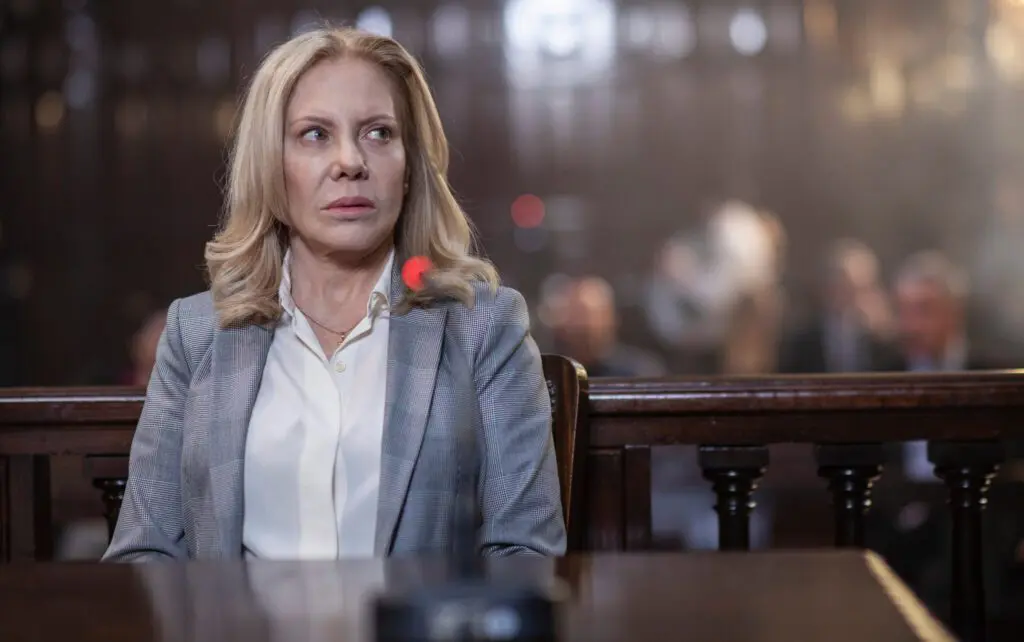Summary
Slow burn and impressive Argentinian drama about a woman determined to support her son, no matter the price; and who also sees her maid through a legal trial of her own.
The Crimes That Bind (originally called Crímenes de familia) has left me a little shaken: what would I do? How would I expect those around me to react? Could I imagine my own son to be the sort of man deserving of a restraining order, someone capable of a severe assault?
Alicia (Cecilia Roth) is enjoying a comfortable and pastel-colored retirement when she gets a phone call from a prison. Her son Daniel’s estranged wife has raised complaints against him before, but this is different: he’s never been detained until now. The Crimes that Bind observes Daniel (Benjamín Amadeo) and Marcela (Sofía Gala) both testifying in court, not expecting us to take sides, but knowing that any parent would.
Funny, I assumed I knew that. The film presents Daniel’s parents both attending his hearing, but from that point on, it becomes apparent that they each have a different perspective on Daniel’s behaviors and woes. His father Ignacio (Miguel Angel Solá) is not as warm towards the young and troubled man… but the film belongs to Alicia and the dignified Cecilia Roth. Almost every scene is centered on her, watching her gradually develop her own thoughts, along with her own life, instead of simply being surrounded by other people and their needs or attention.
Almost every scene. At the start, we also see Gladys (Yanina Ávila), the wealthy couple’s live-in maid, stumbling from the bathroom in the dark, stained in blood. This image is repeated a few times as if the writers Sebastián Schindel and Pablo Del Teso do not want to let us forget there is someone less fortunate also living in this grand, sixth-floor apartment. Indeed there is another court case to watch too; one involving a defendant who is much less resourceful and relies on a publicly funded lawyer.

Schindel also directs The Crimes That Bind and does so with studious patience. The pace of the drama reminded me of Juan José Campanella’s The Secret in Their Eyes: this film showed two overlapping stories, though not years apart like the earlier film, and gave a similar jolt to the chest when the protagonist makes a pivotal discovery.
The Crimes That Bind can be called a courtroom drama, but the drama does not come from the tension of the legal outcome. It could be called a domestic drama, but this is no soap-opera style family: Alicia virtually raises Gladys’ son as her own, despite distinctly treating Gladys as a servant. To me, it’s more about justice than anything else, but in a private rather than legal sense.
It’s no surprise to discover that Cecilia Roth spent the formative years of her career working under Pedro Almodovar’s direction: she has the gracefully matured glamour in her body language and her very eyes that screams of his pedigree. The talent which I will remember most from this film though is that of Yanina Ávila: her Gladys has come from an impoverished and neglected background, she has grown up with “a slight developmental delay” and is almost devoutly loyal to her employer, a most unusual role. Ávila is a remarkable actor, especially notable because she has the least experience out of any of the cast.
The Crimes That Bind is not an exciting legal drama, no arguments from Tom Cruise, or last-minute changes of heart in the jury. This is a film that takes its time, as a person’s awakening to the people they think they know can take time. The film’s resolution is just slightly too neat, but this doesn’t take anything away from how rewarding it is.




